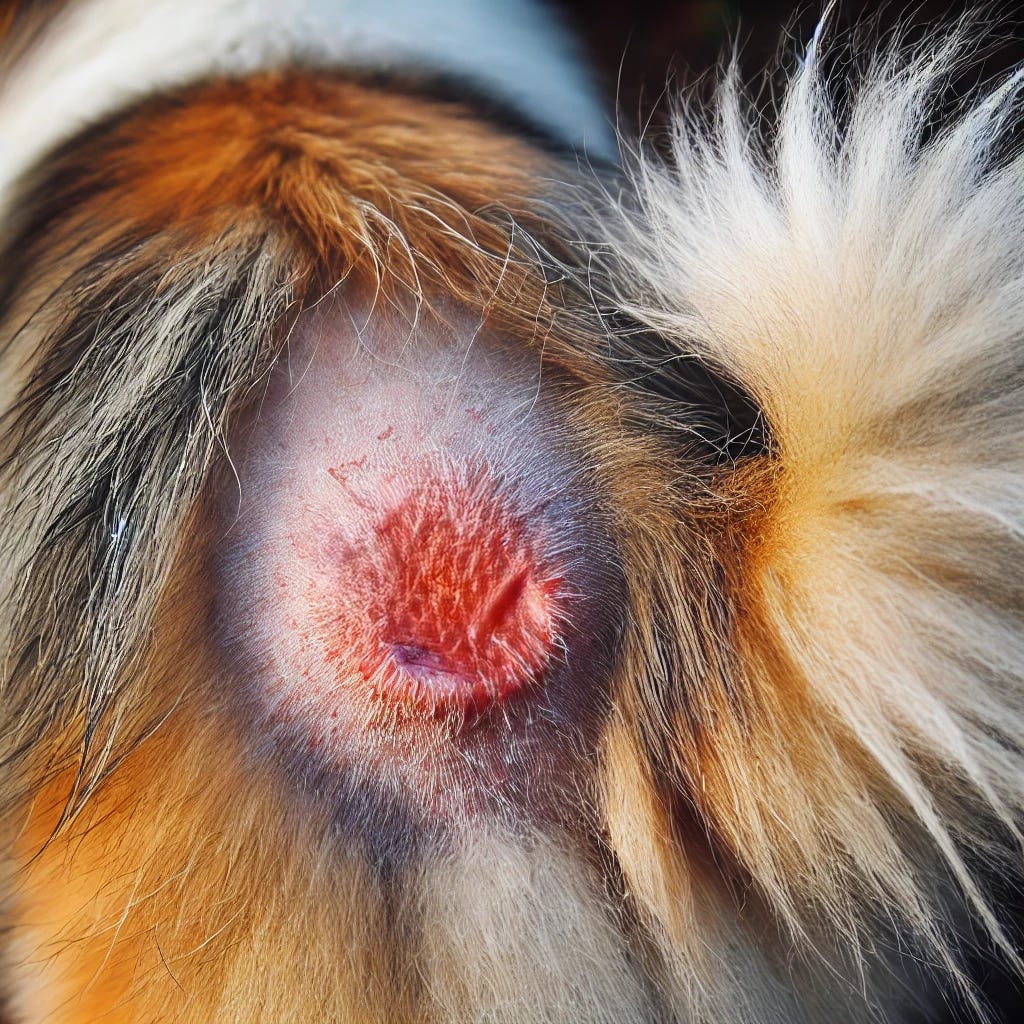Skyscraper Dog Cone
Let's workshop this poem about a collie in a high-rise apartment who exhibits multiple signs of depression and suffering (like pyotraumatic dermatitis, which the owners hope a collar cone will fix).
Skyscraper Dog Cone —for Mike Shaw, who made Gizmo’s life a good one Fur thins in Manhattan at the base of its tail, the slimy pink site of pre-walk combover (too pathetic for Sunday parks now, even with hairspray) where the collie nibbles itself in cooped insanity over nine-to-fives bottling piss and shit at a pawed pane to the sky.









"Skyscraper Dog Cone" is a poignant and unsettling exploration of urban confinement, animal suffering, and the quiet despair that can arise from a life of unnatural restriction. Dedicated to a specific individual and their dog, the poem functions as an **elegy for a confined existence**, using the imagery of an ailing pet to comment on the broader implications of modern urban living. The poem's power lies in its empathetic yet unflinching portrayal of decline and alienation.
Formally, the poem employs a concise, almost vignette-like structure, building its emotional impact through carefully chosen, visceral details. The title itself, "Skyscraper Dog Cone," immediately juxtaposes the vastness of the city with the symbol of restriction and medical necessity, creating a sense of incongruity and pathos. The opening lines, "Fur thins in Manhattan / at the base of its tail, the slimy / pink site of pre-walk combover," paint a vivid and disturbing picture of the dog's physical deterioration and its owners' attempts to mask it. The parenthetical "(too pathetic for Sunday parks / now, even with hairspray)" conveys a deep sense of shame and loss of dignity, extending beyond the animal to imply the owner's vicarious suffering. The enjambment throughout maintains a fluid, natural rhythm, allowing the reader to absorb the unsettling imagery. The final lines succinctly capture the essence of the dog's plight: "in cooped insanity over / nine-to-fives bottling piss and shit / at a pawed pane to the sky." This describes not just physical confinement but a psychological breakdown, driven by the frustration of its natural instincts ("bottling piss and shit") and the tantalizing, yet unreachable, view of the outside world.
Thematically, the poem delves into the **consequences of human lifestyle choices on the non-human world**, particularly pets forced into environments unsuited to their nature. The "collie nibbles itself / in cooped insanity" is a powerful image of self-mutilation driven by psychological distress, a direct result of its urban imprisonment. The "pawed pane to the sky" becomes a symbol of unattainable freedom and the constant, frustrating awareness of what lies beyond the concrete cage. Beyond the literal suffering of the dog, the poem subtly critiques the **alienation inherent in modern urban life**, where even our companions are subjected to the dehumanizing (or de-animalizing) routines of "nine-to-fives." The poem evokes a sense of tragic irony: a life intended to be "good" by human standards of care (implied by the dedication) results in a profound loss of well-being for the animal. It is a quiet lament for natural instincts thwarted and the poignant reality of living in a world "made for us" but not necessarily for those we bring into it.
urban confinement, animal suffering, pet ownership, psychological distress, alienation, modern life, elegy, brutalist lyric, pathos, despair, collie, Manhattan, nature vs. city, ethical implications, animal welfare, confinement, lament.